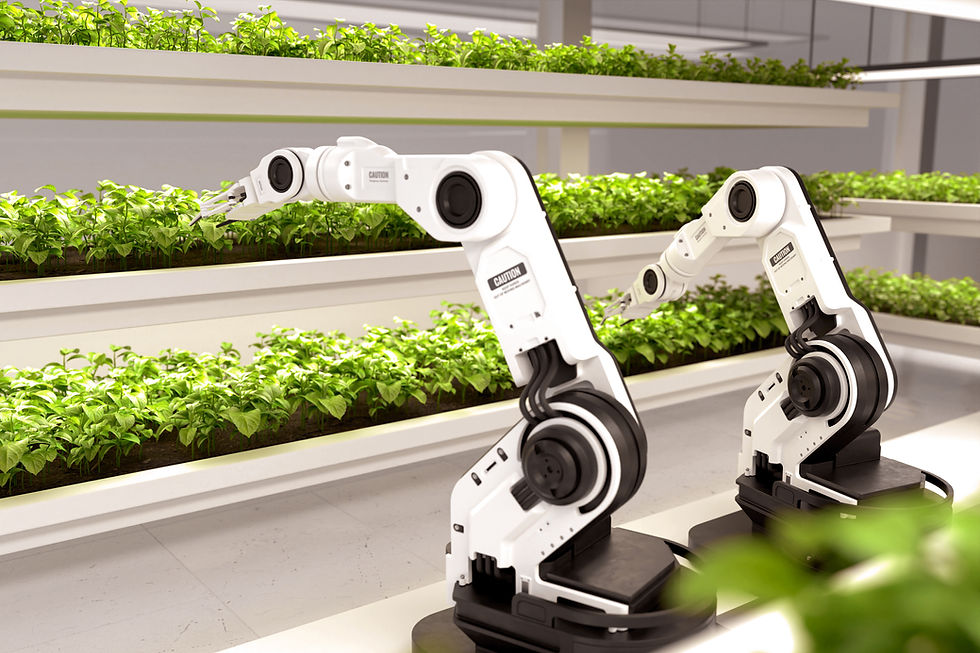The AI (Artificial Intelligence) Revolution: An Opportunity that Very Few Can Comprehend
- Webix Studio

- Dec 26, 2022
- 5 min read
Artificial intelligence has been a hot topic in recent years, with many people excited about the possibilities it brings and others worried about the potential consequences. Regardless of one's feelings about AI, there's no denying that it has the potential to fundamentally change the way we live and work. Some people are calling it the next industrial revolution, and there's no doubt that it will have a profound impact on the world. But what exactly is the AI revolution, what opportunities does it present and how can Bhutan tap into this huge opportunity that comes with AI revolution? To understand this, it's important to first understand what artificial intelligence is and how it works.
What is AI?
Artificial intelligence, or AI, refers to the ability of a machine or computer to perform tasks that would normally require human intelligence, such as recognizing patterns, learning from experience, and problem-solving. There are different types of AI, ranging from simple rule-based systems to more complex machine learning algorithms.
The AI revolution is driven by the rapid advancements in machine learning and the increasing availability of data. Machine learning algorithms are able to process vast amounts of data and learn from it, enabling them to make predictions, classify objects, and perform other tasks with a high degree of accuracy. This has led to the development of many practical applications, such as self-driving cars, virtual assistants, and intelligent recommendation systems. The AI revolution also presents numerous opportunities for individuals and businesses.
For individuals, AI can provide new job opportunities and skills to learn. As more and more companies adopt AI, there will be a growing demand for people who are proficient in machine learning and data science. These skills are highly sought after and can lead to lucrative careers in industries such as tech, finance, and healthcare.
For businesses, AI can help automate tasks and processes, leading to increased efficiency and cost savings. It can also provide insights and improve decision-making through data analysis. For example, a company might use AI to analyze customer data and identify trends that can inform marketing strategies or product development.
One of the exciting aspects of the AI revolution is the potential for it to improve and enhance our lives in ways we can't even imagine yet. AI can help us to better understand and solve complex problems, from climate change to healthcare. It can also assist in the development of new technologies and innovations that could improve our quality of life. There are also opportunities for AI to be used for social good, such as in disaster response and humanitarian efforts. For example, AI could be used to analyze satellite imagery to identify areas that have been affected by natural disasters, or to assist in search and rescue operations.


Some Modern Applications of AI
(Tools that you and I can utilize)
There have been many exciting advancements in the world of artificial intelligence (AI) in recent years. Here are a few examples:
DALL-E: DALL-E is a deep learning AI developed by OpenAI that can generate images from text descriptions. For example, if you input the text "a two-story pink house with a white fence and a red door," DALL-E will generate an image of a house that matches the description. This technology has the potential to revolutionize how we create and share visual content.
GPT-3: GPT-3 (Generative Pre-training Transformer 3) is a language processing AI developed by OpenAI. It is one of the largest and most advanced language models to date, with the ability to generate human-like text and perform tasks such as translation, summarization, and question answering.
DeepMind's AlphaFold: This is an AI developed by DeepMind that can predict the 3D structure of proteins, which are essential for the functioning of all living organisms. This technology has the potential to revolutionize drug discovery and improve our understanding of diseases.
Self-driving cars: Self-driving cars, also known as autonomous vehicles, use a combination of AI, sensors, and GPS to navigate roads and traffic. While they are still in the early stages of development, they have the potential to transform transportation and make it safer and more efficient.
Healthcare AI: AI is being used in healthcare to improve diagnosis, treatment, and patient care. For example, AI can analyze medical images to identify abnormalities, help doctors make more accurate diagnoses, and provide personalized treatment recommendations.
These are just a few examples of the many exciting advancements in the world of AI. As the field continues to evolve, we can expect to see even more transformative technologies and applications emerge.

How can Bhutan tap into the huge opportunity that comes with AI Revolution?
Bhutan has the potential to tap into the AI revolution. Here are a few ways to how:
Invest in education and training: Bhutan can invest in education and training programs that focus on artificial intelligence and related fields, such as machine learning and data science. This will help to build a strong talent pool of skilled professionals who can contribute to the development of AI in Bhutan.
Promote research and development: Bhutan can support research and development efforts in AI by providing funding and resources to researchers and startups working in this field. This could involve establishing research labs or incubator programs to support the development of new AI technologies.
Partner with leading AI companies: Bhutan can seek partnerships with leading AI companies and organizations to access their expertise and resources. This could involve collaborating on joint research projects or inviting these companies to set up operations in Bhutan.
Develop AI-focused policies and regulations: Bhutan can develop policies and regulations that support the growth of AI in the country. This could include establishing guidelines for the responsible development and use of AI, as well as creating incentives for companies to invest in AI research and development.
Leverage AI for social good: Bhutan can use AI to address social and environmental challenges, such as improving healthcare and education, conserving natural resources, and addressing climate change. This could involve using AI to analyze data and identify patterns that can inform policy and decision-making.
The Ethical Concerns
It's important to note that the AI revolution also brings with it some challenges and ethical considerations. There is a risk that automation could lead to job displacement, particularly in industries where tasks can be easily automated. There are also concerns about the potential for AI to be used for malicious purposes, such as cyberattacks or surveillance. It's crucial that we address these challenges and consider the ethical implications of AI as it continues to develop. This will require collaboration between governments, businesses, and researchers to establish guidelines and regulations. It's important to recognize that the AI revolution is a global phenomenon and that it will have different impacts on different countries and regions. Some countries are already leading the way in the development and adoption of AI, while others may struggle to keep up. It will be important for governments and businesses to work together to ensure that the benefits of AI are shared as widely as possible and that no one is left behind.
Conclusion
In conclusion, the AI revolution is a once-in-a-generation opportunity to shape the future. It has the potential to transform industries, improve our lives, and solve some of the world's most pressing problems. However, it's important that we approach it with caution and consideration, addressing the challenges and ethical implications as they arise. By working together, we can ensure that the AI revolution is a positive and transformative force for all.







Comments